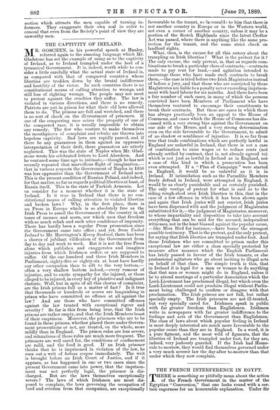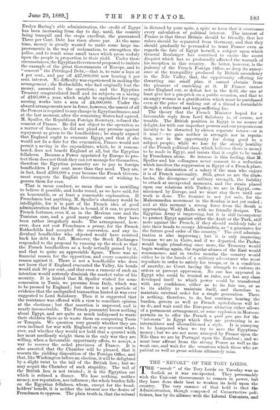THE FRENCH INTERFERENCE IN EGYPT.
rpHERE is something so pitifully mean about the action 1 of the French. Government in the matter of the Egyptian " Conversion," that one looks round with a cer- tain eagerness for an honourable explanation. Under Sir Evelyn Baring's able administration, the credit of Egypt has been increasing from day to day, until, the country being tranquil and the crops excellent, the guaranteed Three per Cent. Debt has risen above par. At the same time, money is greatly wanted to make some large im- provements in the way of reclamation, to strengthen the police, and to remit some small taxes which press unduly upon the people in proportion to their yield. Under these circumstances, the Egyptian Government proposed to imitate the example of the great Governments of Europe, and to " convert " the Privileged Debt,—that is, to raise a loan at 4 per cent., and pay off £27,000,000 now bearing 5 per cent. interest. No difficulty was experienced in making the arrangement ; the Rothschilds, who had originally lent the money, assented to the operation ; and the Egyptian Treasury congratulated itself and its subjects on a saving of £160,000 a year, which might be capitalised for engi- neering works into a sum of £4,000;000. Under the absurd arrangements now in force, however, the assent of all the Powers is required to any change in Egyptianfinance, and at the last moment, after the remaining States had agreed, M. Spuller, the Republican Foreign Secretary, refused the consent of France. He did not object to the operation as a matter of finance ; he did not plead any promise against repayment as given to the bondholders ; he simply argued that England ought to evacuate Egypt, and that if she would not fix a date for the evacuation, France would not permit a saving in the expenditure, which, be it remem- bered, does not benefit England at all, but the Egyptian fellaheen. Because a Power appointed by Europe to pro- tect them does not think they can yet manage for themselves, therefore the Egyptian peasantry are to pay to foreign bondholders 1 per cent. more than they need. They are, in fact, fined £160,000 a year because the French Govern- ment suspects the English Government of wishing to govern them for ever.
That is mean conduct, so mean that one is unwilling to believe it possible, and looks round, as we have said, for an honourable, or at least a reasonable explanation. If Frenchmen lost anything, M. Spuller's obstinacy would. be intelligible, for it is part of the French idea of good administration that the State is bound, if it can, to protect French fortunes, even if, as in the Mexican case and the Tunisian case, and a good many other cases, they have been rather irregularly made. The arrangement, how- ever, does not cost Frenchmen a penny, for the French Rothschilds had accepted the conversion, and any in- dividual bondholder who objected would have received back his debt in full. Moreover, the Stock Exchanges responded to the proposal by running up the stock so that the French bondholders as a body actually gained by it, and that to quite an appreciable figure. There was no financial reason for the opposition, and every conceivable reason against it. There is not a bondholder who does not know that if England evacuated the Valley, his bonds would sink 30 per cent., and that even a rumour of such an intention would seriously diminish the market value-of his security. It is hinted that M. Spuller wished for some concession in Tunis, we presume from Italy, which was to be pressed by England ; but there is not a particle of evidence that the undignified transaction hinted at was ever suggested to Lord Salisbury. Then it is suggested that the resistance was offered with a view to conciliate opinion at the elections ; but that assertion is unproved, and is nearly inconceivable. The French peasantry know nothing about Egypt, and are quite as much indisposed to waste their children there as to waste them on conquering Tunis or 'Tonquin. We question very greatly whether they are even inclined for war with England on any account what- ever, and whether they would not hold that a quarrel with her must needlessly weight them in the only war they are willing, when a favourable opportunity offers, to accept, a war to recover the ceded provinces of France. It is also asserted that the Chamber will be pleased, that it resents the yielding disposition of the Foreign Office, and that, Like Washington before an election, it will be delighted by a slight twist to the tail of the British lion ; but we may acquit the Chamber of such stupidity. The tail of the British lion is not twisted ; it is the Egyptian cat which is refused a dinner. We lose nothing, neither money, nor reputation, nor influence ; the whole burden falls on the Egyptian fellaheen, whom, except for the bond- holders' benefit, it is -neither the interest nor the -desire of Frenchmen to oppress. 'The plain truth is, that the refusal is dictated by pure spite, a spite so keen that it overcomes every calculation of political interest. The interest of France is that Great Britain should be friendly, that her rulers should be separated from Germany, and that they should gradually be persuaded to trust France even as regards the fate of Egypt herself, a subject upon which General Boulanger has contrived to excite the secret disquiet which has so profoundly affected the warmth of lis reception in this country. So bitter, however, is the jealouiy of the French Foreign Office, so deep its annoy- ance at the tranquillity produced by British ascendency in the Nile Valley, that, the opportunity offering for thwarting one small plan, it cannot abstain from the pleasure of snatching at it. If France cannot order England out, or defeat her in the field, she can at least give her a pin-prick on a public occasion, and that to an angry woman is a gratification which must be purchased even at the price of making out of a friend a formidable though a reluctant and long-suffering foe.
The theory that the French Minister hoped for a favourable reply from Lord Salisbury is, of course, not tenable. The British position in Egypt is no source of delight, for with our imperfect powers and our preposterous liability to be thwarted by eleven separate vetoes—or is it nine P—we gain neither in strength nor in reputa- tion, nor in the opportunity for . doing good to a subject people ; while we lose by the steady hostility of the French political class, which believes there is money to be made in Egypt, and insists that it ought to be made by Frenchmen alone. So intense is this feeling, that M. Spuller and his colleagues never consent to a reduction which involves the suppression in Egypt of a French place, or to the diminution of a salary if the man who enjoys it is of French nationality. Still, great as are the draw- backs, the divergence of military strength, the liability to attack at unexpected moments, and the strain placed upon our relations with Turkey, we are in Egypt, com- missioned by Europe, and we must stay there until our work is done. The frontier is not yet safe, for the Mahommedan movement in the Soudan is not yet ended ; and at 'this moment a strong force from the South is approaching Wady Haifa with no friendly designs. The Egyptian Army is improving, but it is still incompetent to protect Egypt against either the Arab or the Turk, still more against the French, if they should suddenly take it into their heads to occupy Alexandria, as " a guarantee for the future good order of the country." The civil adminis- tration is also improving; but it is only improving because we are in Cairo, and if we departed, the Pashas would begin plundering once more, the Treasury would begin wasting again, the regular abuses of the East would recommence, and in twelve months the country would either be in the hands of a military adventurer who must repudiate in order to satisfy his troops, or in a condition of anarchy, no Court having the strength to enforce its orders or prevent oppression. No one has appeared in Egypt who could be trusted as ruler, nor has any class developed itself to which power could be transferred with any confidence, either as to its fair use, or as to its ability to maintain itself, and therefore to maintain external order for a single generation. There is nothing, therefore, to do, but continue bearing the burden, govern as well as French spitefulness will let us do, and wait until the European situation either allows of a permanent arrangement, or some explosion in Morocco permits us to offer the French a quid pro quo for the " interests " in Egypt which they are protecting in so intermittent and ill-conditioned a style. It is annoying to be hampered when we try to save the Egyptians' money; but we are not more annoyed by France upon the Nile than we are by Portugal upon the Zambesi • and we must bear affront from the strong Power as well as the weak one, and wait for the occasions which those who are patient as well as great seldom ultimately miss.



































 Previous page
Previous page